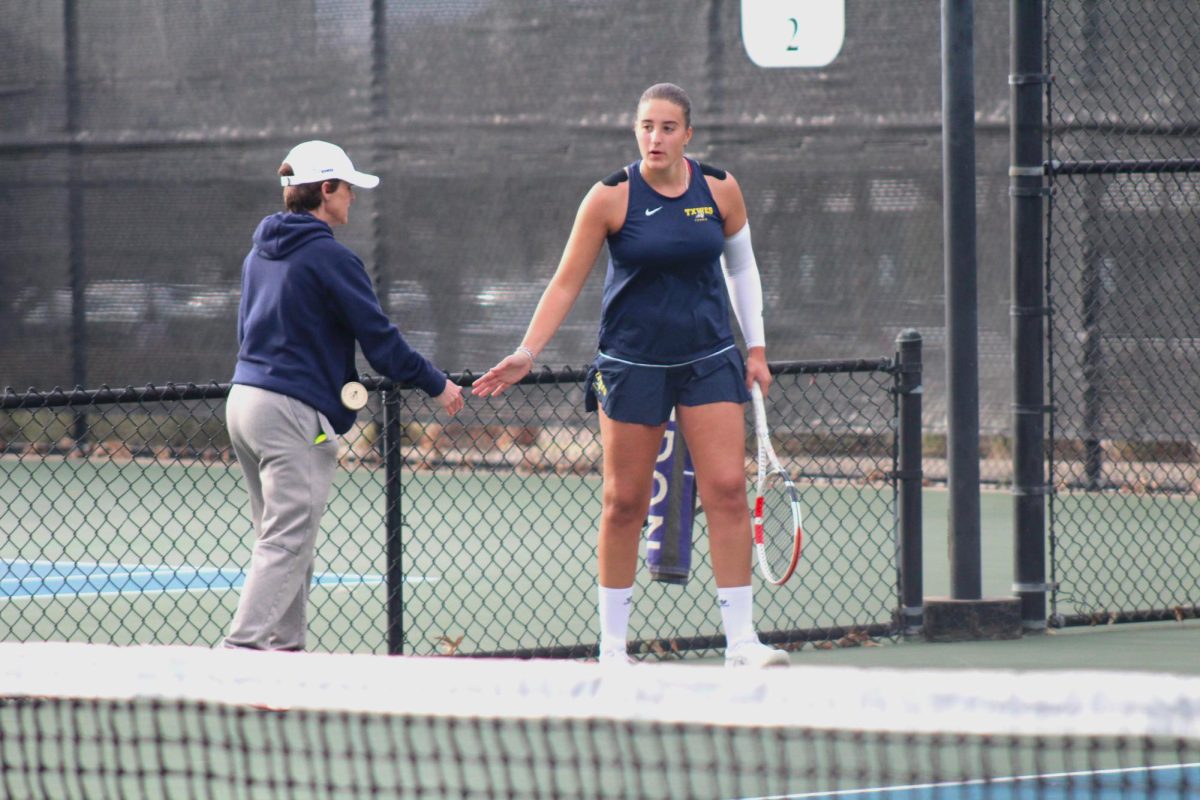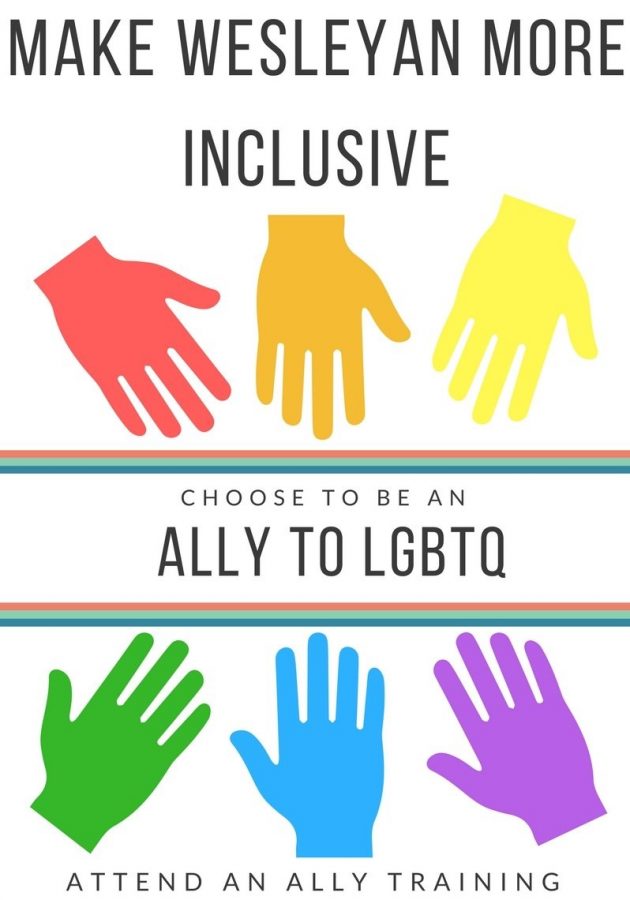In spring 2016, Dr. Alison Simons, associate professor of sociology and Gay-Straight Alliance advisor, approached David Monge, coordinator of Student Life and Greek Life, about expanding the Gay-Straight Alliance’s ally training program into something bigger.
A year later, Monge has provided the program with a permanent home in Student Affairs, offering workshops to make Texas Wesleyan more inclusive and LGBTQ-safe.
“Hopefully with it being more than just GSA, it will expand compassion and understanding between all the students and hopefully we’ll get it to professors too,” Simons said. “That way there will be more of those circles with the safe (symbol) and anybody will know that it’s safe.”
Simons said the GSA had originally developed the ally training program then called safe zone training from thesafezoneproject.com, which is a free resource for developing LGBTQ awareness and workshops.
“We’re teaching people how to include other people and not to exclude them,” Simons said. “We’re a very diverse campus so an ally training program that teaches people to accept other people or to at least tolerate them definitely works in our favor.”
Simons said GSA passed all that information to Monge. Monge and Chelsea Sepolio, the assistant director of student conduct and civility, are currently the facilitators for the ally training program.
“This program existed prior to us rebranding and relaunching,” Monge said. “I know it had been sort of defunct for at least a year maybe more. We were just charged with sort of expanding the program and reaching a wider audience.”
Simons said that GSA wanted to work more closely on the project with Monge but things didn’t work out that way.
“He’s taken it and is controlling it now, which is great,” Simons said. “The GSA will still be involved in it, but unfortunately our president didn’t come back this semester so as an organization we’re floundering.”
Simons says she’s glad to see Monge expanding the program to students.
“We built the curriculum and we spent all of last semester testing it with target groups,” Monge said. “We did one with our student workers in this office so Student Life, residence assistants, and then marketing and communications.”
Monge said the training goes over basic information relating to LGBTQ people and different scenarios people may face. Monge and Sepolio hosted the first general ally training session Feb. 28.
“We had the first general session training, which was well received,” Sepolio said. “We hope that this continues to be a process not only for us as facilitators, but for everyone at Wesleyan to kind of build this culture of respect no matter how you identify.”
Both Sepolio and Monge agree that even if you don’t agree with the material, the training can be beneficial. They have goals to expand the program even further.
“I think the goal would be to have every professional faculty or staff member and every first-year student be ally trained so they have at least have an understanding,” said Monge. “Even if they disagree with the things that we’re talking about at least they know what they’re disagreeing with.”
Monge and Sepolio said that it is important for students to know exactly what they are disagreeing with if they don’t accept LGBTQ people or want to be around them, and still want to handle that situation professionally.
“We’re going to tailor our responses to be developmental and to be educational, because this is a formative time where our students are learning how to have these roadblocks and developmental conversations now,” Sepolio said, “before the future where it’s going to be very important to know when they go to their professional roles.”
Although some may disagree with the ally training program, Sepolio and Monge hope students do choose to be LGBTQ allies.
“I think being an ally, it’s deeper than being supportive of something,” Monge said. “It sort of assumes action in some way. In the extreme side I think there are times it could look like a confrontation but really it could be as simple as talking to your friends about it or Facebook posts.”
Monge, Sepolio, and Simons all hope to see students, faculty, and staff join a training succession with an open mind.
“We’re only a small family,” Simons said. “I mean our student body’s only like 2,200 [people]. We really don’t have the luxury of picking and choosing to hate people. As a family, we need to be a lot more tolerate.”
If an organization or department on campus would like a tailored ally training program, contact David Monge at dmonge@txwes.edu.




![Rambler staff pose following the Texas Intercollegiate Press Association Convention award breakfast. [Photo courtesy Dr. Jenny Dean]](https://therambler.org/wp-content/uploads/2025/04/IMG_2646-1200x900.jpeg)

![Pippin, played by Hunter Heart, leads a musical number in the second act of the musical. [Photo courtesy Kris Ikejiri]](https://therambler.org/wp-content/uploads/2025/04/Pippin-Review-1200x800.jpg)

![Harriet and Warren, played by Trinity Chenault and Trent Cole, embrace in a hug [Photo courtesy Lauren Hunt]](https://therambler.org/wp-content/uploads/2025/02/lettersfromthelibrary_01-1200x800.jpg)




![The Texas Wesleyan University women's golf team walks the course. [Photo courtesy of Corrina Griffin]](https://therambler.org/wp-content/uploads/2025/04/rounds-902x1200.jpg)
![Hunter Heart (center), the play's lead, rehearses a scene alongside other student actors. [Photo courtesy Jacob Sanchez]](https://therambler.org/wp-content/uploads/2025/04/thumbnail_IMG_8412-1200x816.jpg)
![Student actors rehearse for Pippin, Theatre Wesleyan's upcoming musical. [Photo courtesy Jacob Rivera-Sanchez]](https://therambler.org/wp-content/uploads/2025/04/Pippin-Preview-1200x739.jpg)

![Lady Rams softball wraps up weekend against Nelson Lions with a victory [6 – 1]](https://therambler.org/wp-content/uploads/2025/04/Screenshot-2025-04-04-100924-1200x647.png)


![Lady Rams softball sweep Langston Lions in first SAC Doubleheader [2 – 0]](https://therambler.org/wp-content/uploads/2025/02/SoftballLions.png)













